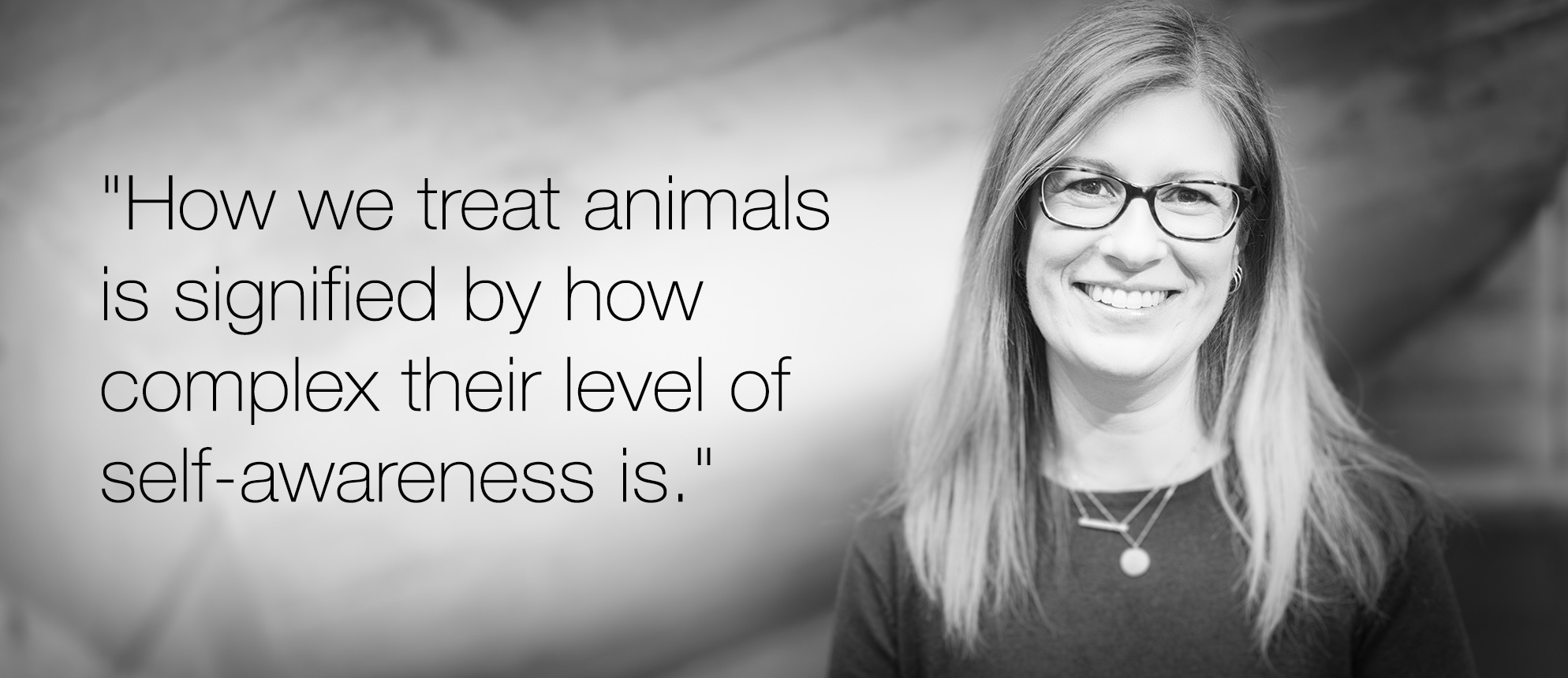
 After years of research into animal ethics, Dr. Natalie Evans has found that the way humans think about animals often depends largely on how humans believe those animals think.
After years of research into animal ethics, Dr. Natalie Evans has found that the way humans think about animals often depends largely on how humans believe those animals think.
An instructor in the Media Studies program at the University of Guelph-Humber, Dr. Evans has recently published Animal Ethics and the Autonomous Animal Self, a book that challenges the notion that only humans are capable of agency, autonomy and self-awareness.
Dr. Evans, who is also an associate fellow at the Oxford Centre for Animal Ethics at the University of Oxford in England, uses research into the minds of animals to argue that different species of animals have different degrees of self-awareness and autonomy.
It’s an area of philosophy that still inspires passionate debate, said Dr. Evans, who teaches media ethics, mass communications and film studies at the University of Guelph-Humber.
What led you to study whether animals can be capable of self-awareness?
When I was studying ethics, my question to myself was: OK, what does ethics all boil down to? Why do we care about how we treat anyone else, ever? A lot of ethics is divided into how humans are self-aware and animals may be aware, but they’re not self-aware. But if you’re not self-aware, then you don’t really care what happens to you even if you’re conscious, right? I didn’t like that. It gives us an excuse for treating animals in ways that are clearly wrong. I tried to argue in the book that it’s not either you have a self or you don’t, but rather it’s a gradient. It’s a scale. Human selfhood might be that we worry about the kind of person we want to mould ourselves into. For animals, it might simply be an awareness of that’s my foot, it hurts. That’s still self-awareness, it’s just a different level of complexity than ours is. If animals are self-aware to varying degrees, we should respect them to varying degrees. How we treat animals is signified by how complex their level of self-awareness is.
The book also examines the possibility that humans aren’t the only species who can make decisions?
I basically argued that if animals are self-aware to some degree, they do make decisions and choices about what they want and don’t want. If they’re capable of making choices at all then we owe them a certain level of respect. And the autonomy part is respecting the freedom they have to respect their own choices. When animals are forced to live in captivity, clearly those species don’t want to live like that. So to me that’s infringing on their autonomy to live the way they want to live. We do it as humans; we agree we’re all autonomous and we find ways of respecting it as much as possible. It’s the same with animals.
Is this a controversial topic?
It still is, yes. I argue in the book that we think about pigs and dogs in an inconsistent way. We love our dogs and we eat pigs. If you’re looking at mental capacities and being consistent, you just can’t do that. But that idea bothers people. There are also still some holdouts in psychology and philosophy who are just extremely skeptical about applying any of these concepts to animals. So there’s still resistance to be sure. But I’m finding that people are more interested in animal ethics, even if they haven’t quite got to the point of really taking it seriously. I think people are more willing to accept that animals can suffer. There’s a huge movement in animal welfare in grocery stores, with the way meat is raised starting to matter a lot more. But there are still pockets of resistance.
Have you always been an animal lover?
Yes. We always grew up with pets. When I was really little, we lived in between farms, so we were surrounded by cows and I used to be out talking and singing and performing for the cows all the time. I became a vegetarian in my teens, when a lot of people thought it just wasn’t healthy. Now crossing over to media, I got a University of Guelph-Humber research grant and we were studying animals in Canadian news media, comparing how Canadian news stories talked about companion animals, research animals and agricultural animals. I’m talking to my publisher Palgrave about turning this into my second book. In Media Studies, we talk about and teach how media affects our perception of the world, so now I’m just looking at how does it affect our perception of animals?
Learn more about Media Studies at the University of Guelph-Humber.
Learn more about Research at the University of Guelph-Humber.

